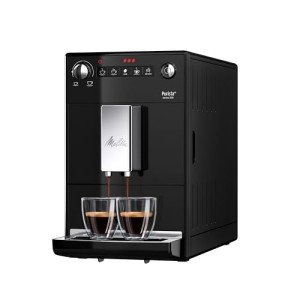Home Use Espresso Machines: A Comprehensive Guide
Espresso machines have become a staple in lots of households as coffee lovers seek to duplicate café-quality brews in the convenience of their kitchens. The increase in appeal has resulted in a varied market filled with different models, functions, and costs. This short article intends to supply a useful summary of home use espresso machines, assisting readers browse their alternatives successfully.
Understanding Espresso Machines
Espresso machines work by forcing hot water through finely-ground coffee under high pressure, resulting in a concentrated coffee beverage called espresso. There are numerous types of espresso machines classified based upon their developing methods and level of automation. The most common types consist of:
- Manual Espresso Machines: These need the user to control the pressure and water flow, enabling for a more hands-on coffee-making experience.
- Semi-Automatic Espresso Machines: These provide automatic control over water pressure, while the user by hand grinds and tamps the coffee.
- Automatic Espresso Machines: With the push of a button, these machines automatically manage the flow of water, making it easier to brew espresso with constant outcomes.
- Super-Automatic Espresso Machines: These all-in-one machines handle grinding, tampering, brewing, and even milk frothing, making them ideal for users looking for convenience.
- Pill or Pod Machines: These use pre-packaged coffee pods to produce espresso with minimal effort, but they limit choice in brewing methods and flavors.
Table: Comparison of Espresso Machine Types
| Type | Control Level | Relieve of Use | Cleaning Level | Suitable For |
|---|---|---|---|---|
| Manual | User-controlled | Moderate | High | Coffee purists |
| Semi-Automatic | Partial automation | Moderate | Moderate | Home baristas |
| Automatic | Totally automated | Easy | Low | Busy people |
| Super-Automatic | Fully automated | Extremely easy | Really low | Convenience seekers |
| Capsule/Pod | Fully automated | Really simple | Really low | Casual drinkers |
Secret Features to Consider
When choosing a home use espresso machine, it's vital to consider numerous features that can substantially impact the quality of espresso and user experience.
- Pressure: Look for machines that offer at least 9 bars of pressure, as this is considered optimal for brewing espresso.
- Boiler Systems: Single vs. dual boiler systems figure out temperature stability and the ability to brew espresso and steam milk simultaneously.
- Grinder: Integrated mills permit freshly ground coffee, which boosts taste. Consider machines with adjustable grind settings.
- Milk Frother: For those who take pleasure in coffees and lattes, a built-in steam wand or automatic frother is essential.
- Size and Design: Consider your kitchen area and visual choices. Machines can be found in various sizes, from compact to big setups.
- Price: Home espresso machines can range from a few hundred to a number of thousand dollars, so it's crucial to develop a budget before exploring choices.
Pros and Cons of Home Use Espresso Machines
| Pros | Cons |
|---|---|
| Convenience of brewing coffee at home | Initial investment can be high |
| Quality of espresso is frequently superior | Needs some ability, specifically with manual machines |
| Ability to explore tastes | Maintenance and cleaning can be labor-intensive |
| Can conserve money in the long run | Not all machines will match every coffee preference |
Maintenance and Cleaning Tips
Preserving an espresso machine is crucial for extending its life and guaranteeing constant brew quality. Here are some useful pointers:
- Regular Descaling: Minerals from water can construct up in the machine. Descale every 1-3 months, depending on water firmness.
- Daily Cleaning: Rinse portafilters, baskets, and steam wands after each use to avoid coffee oils from developing residue.
- Use Filtered Water: This can assist minimize mineral buildup and improve the taste of coffee.
- Change Gaskets and Seals: These parts might wear over time and needs to be changed to preserve pressure and performance.
- Check out the Manual: Each machine has particular care guidelines; following these will ensure longevity.
FAQs About Home Use Espresso Machines
Q1: What is the best budget espresso machine?The best budget espresso machine frequently depends on individual needs, however designs like the DeLonghi EC155 or the Breville Bambino are popular among users for offering fantastic value. Q2: How long do home espresso machines usually last?With appropriate maintenance, home espresso machines can last anywhere from 5 to 15 years, depending on the quality of the machine and frequency of use. Q3: Can I make cappuccinos and lattes with any espresso machine?While most espresso machines can make cappuccinos and lattes, having a dependable
steam wand or frother is vital for accomplishing the ideal milk texture.
Q4: Are super-automatic machines worth the investment?For Commercial Espresso Machines who focus on benefit and quick developing, super-automatic machines can be worth the financial investment, though they may lack some customizability in brew strength and flavor. Q5: What kinds of coffee beans are best for espresso?While personal preference contributes, beans identified as" espresso "blends are usually roasted darker, producing rich tastes and a velvety texture when brewed.
Investing in a home espresso machine can transform the everyday coffee routine into something unique, elevating home brews to café quality. By understanding the different types of machines, key functions to consider, upkeep requirements, and weighing the
benefits and drawbacks, consumers can make educated decisions that fit their individual choices. As the espresso culture continues to grow, no matter the choice, every brew can be a delicious experience waiting to be appreciated.

